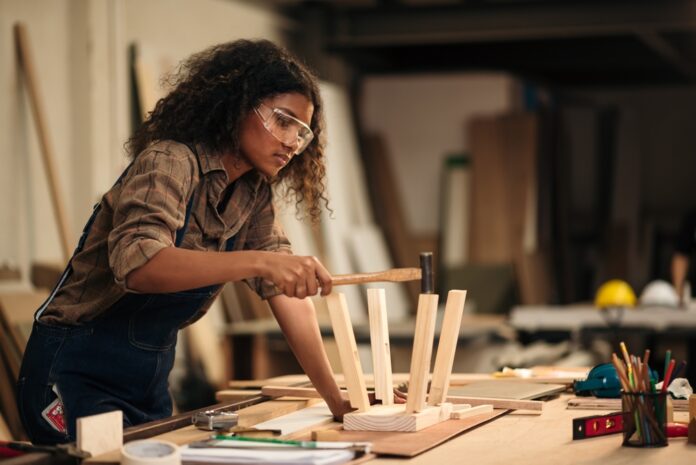Woodworking is a timeless craft that offers both creativity and practicality. The idea of transforming raw pieces of wood into something functional or beautiful with your own hands is incredibly satisfying. If you’ve ever wanted to dive into woodworking but felt held back by the perceived need for an extensive tool collection, you’re not alone. The good news is that you can start woodworking with just a few essential tools and a passion for learning.
Embracing a Minimalist Approach
Starting with a minimal set of tools not only reduces the upfront cost but also encourages you to develop your skills more deeply. By focusing on a few versatile tools, you learn to maximize their potential, which can lead to better craftsmanship in the long run.
Richard Maguire, a seasoned woodworker from The English Woodworker, shares that a basic toolkit shouldn’t just be seen as a budget constraint but also a preference for efficiency and skill development. He emphasizes that mastery of a few essential tools can guide your woodworking journey effectively.
Essential Tools for Beginners
Hand Tools: Your Starting Point
Hand tools are the foundation of woodworking. They require no electricity and give you a tactile connection to your work.
- Saws: A good starting point is a tenon or carcass saw. These are versatile for small joinery tasks, including dovetails and other joints. Richard suggests investing in a saw with a shallow depth of plate and around 14 teeth per inch (tpi) for better accuracy. He also notes that choosing a saw with rip teeth rather than cross-cut teeth is beneficial for most joinery work.
- Chisels: A set of three chisels can handle most tasks. They are essential for cleaning up joints and fine-tuning your work.
- Planes: A No. 5 Jack plane is versatile for smoothing and shaping wood. Richard mentions that having two irons for your plane can expand its functionality without needing multiple planes.
- Marking Tools: A combination square, a marking knife, and a marking gauge are crucial for accuracy. Precision in marking leads to precision in cuts and joins, which is vital in woodworking.
- Hammer and Screwdrivers: A claw hammer and a set of screwdrivers will come in handy for assembly and adjustments.
Optional but Helpful Tools
- Hand Drill: Either an eggbeater drill or a small cordless drill can be useful for making holes without the need for power tools.
- Clamps: G-clamps or F-clamps help hold your workpiece steady during cutting or gluing.
- Sharpening Stone: A Norton double-sided oil stone is recommended for sharpening your tools, ensuring they work efficiently.
Starting with Simple Projects
Beginning with projects that match your skill level is crucial. Simple items like a birdhouse, a planter box, or a basic shelf can help you practice measuring, cutting, and assembling without overwhelming you.
Chris Schwarz, an experienced woodworker, advises utilizing resources that provide guidance on assembling a cost-effective toolkit and offer simple projects. He suggests starting with the “I Can Do That” section on their website, which is designed for beginners looking to get hands-on experience.
Building Skills Over Acquiring Tools
There’s a common misconception that you need to accumulate a vast array of tools to be a successful woodworker. However, focusing on improving your skills with the tools you have is more important.
As some seasoned woodworkers suggest, it’s better to:
- Invest in good-quality tools gradually rather than buying many cheap tools that may not last.
- Focus on mastering techniques with your current tools before expanding your collection.
- Learn through making practical items, which helps you understand what tools you actually need.
Tips for Acquiring Tools Economically
- Buy Used Tools: Many woodworking tools are durable and can last generations. Purchasing second-hand tools can save money while still providing quality.
- Borrow or Share Tools: If you have friends or join a woodworking club, you might have access to tools you don’t own yet.
- Avoid Impulse Purchases: Before buying a new tool, consider if it’s essential for your current projects.
Richard Maguire shares from his experience that having fewer, familiar tools can be more effective than owning numerous ones you’re less comfortable with.
Join the Woodworking Community
Engaging with other woodworkers can accelerate your learning and keep you motivated.
- Online Forums and Blogs: Participating in discussions can provide insights and answers to your questions.
- Local Clubs: Joining a woodworking club can offer hands-on help and possibly access to communal tools.
- Workshops and Classes: Structured learning can help you build foundational skills efficiently.
Safety First
While working with tools, safety should always be a priority.
- Protective Gear: Wear safety glasses and, when necessary, hearing protection.
- Tool Maintenance: Keep your tools sharp and in good condition to prevent accidents.
- Workspace: Ensure your workspace is organized and free of hazards.
The Rewarding Journey Ahead
Starting a woodworking hobby with minimal tools is not only feasible but also can be an incredibly rewarding experience. By focusing on skill development, careful planning, and a thoughtful approach to tool acquisition, you set yourself up for continual improvement.
Remember, woodworking is a journey where patience and practice lead to mastery. As many experienced woodworkers advise, it’s about valuing the process over perfection and enjoying the craft.
Happy woodworking!


